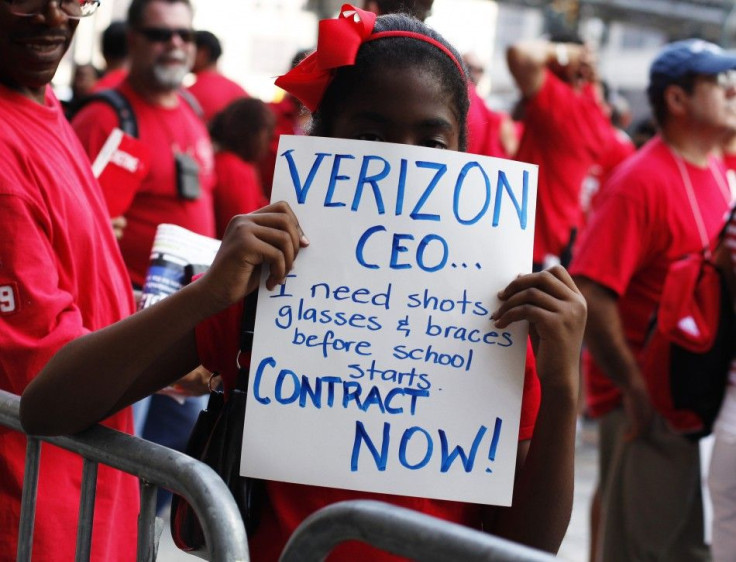Verizon Claims Sabotage, Calls FBI; Tensions in 45K Worker Strike Rise

Tensions between Verizon and its striking 45,000 employees increased on Friday as the company called the FBI to investigate allegations of sabotage.
Federal Bureau of Investigation spokesman Jim Margolin confirmed that an inquiry is under way and is behind handled from the FBI's Newark, N.J. field office, according to CNNMoney.
The union organizaton representing the 45,000 striking workers -- Communication Workers of America -- condemned the acts.
"CWA does not condone legal action of any kind, and instructs its members to conduct all strike activities in accordance with labor law," the union said in a statement.
Verizon's 45,000 union landline workers went on strike late Sunday.
The company put out a press release Thursday saying, "Verizon continues to provide solid service on day five of a strike by the Communications Workers of America."
But a report from The Baltimore Sun Thursday detailed how residents at a senior living village in Ellicott City, Md. haven't had landline phone service in five days, since the strike began.
One resident at the village told the newspaper how difficult communication has been for she and other residents since most don't have cell phones. Without landlines out, they've had to adjust.
"About half of us are on oxygen or have various physical disabilities," said Cynthia Bonora, 78. "Most of us don't have cell phones."
She said her daughter tried to call to see if she needed any medications or groceries and couldn't get through, so she had to drive over.
The 45,000 Verizon landline workers are members of the Communications Workers of America, representing employees in the Northeast, including New York and Maryland.
Negotiations between the company and labor have become tense, quickly. The company has successfully sought injunctions to limit the size of picket lines, while dealing with more than 90 acts of sabotage against network facilities.
The company also says it has received "numerous reports of union picketers intimidating drivers and illegally blocking garage and work center entrances used by regular and fill-in employees.
"These incidents have created dangerous and disruptive work environments both for employees attempting to provide support to Verizon customers and for the picketers themselves," the company said in a press release.
The company has obtained injunctions to "prevent intimidation and illegal blocking of facilities" from Delaware to New York.
But the reason negotiations have become so tense is that Verizon's 45,000 union landline workers in the Northeast feel they are getting what can be be termed as a complete shaft from the company. When the strike began, the company posed it as disagreement primarily over health benefits.
Union workers interviewed from a picket line in Manhattan by the IBTimes have a different view, however. They say its all about the company ultimately trying to kill the union, shifting many jobs to the South where workers aren't unionized.
"I've been with (Verizon) for 32 years," said Greg, a union worker who declined to give his last name, "and worked very hard and you take it personally. They are giving our jobs to somebody down South, taking our food right off our table."
This isn't the first time Verizon landline workers have been on strike. The last time was in 2000, when a strike for 18 days had a noticeable impact on the company's service. The company hoped to avoid service disruption this time, claiming Thursday that's been the case.
But now that the strike, which began late Sunday, nears one week old as talks continue, service issues like the one in Maryland are beginning to crop up.
Candice Johnson, a spokeswoman for the CWA, told The Sun the repair delays may be caused by replacement workers.
"With other companies," said Johnson, "there have been instances where replacement workers, contract workers create more problems."
© Copyright IBTimes 2024. All rights reserved.











